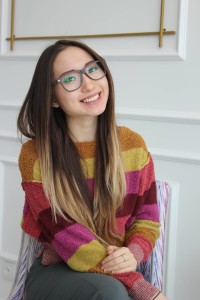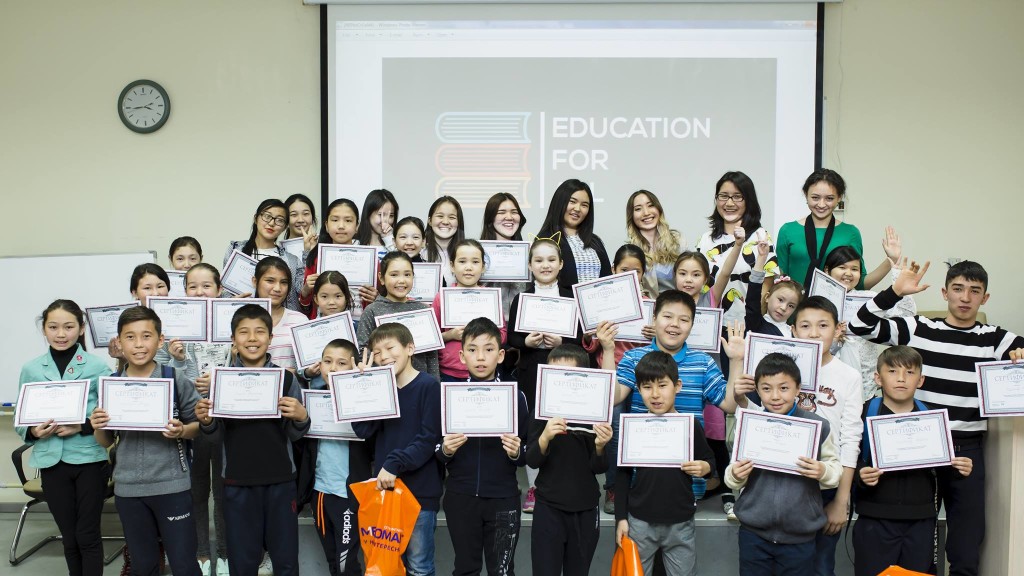ASTANA – The School for All is planning to expand by opening a new office in the capital to welcome more children of all abilities. Set up two years ago by Nazarbayev University (NU) student Kamila Rollan, the social enterprise has the mission of including children with special needs into regular classrooms.
How it started
Rollan began her volunteering and social activities in 2012 when she founded the NU Red Crescent Society. Co-founder of the School for All Sabina Ismailova collaborated with the Solnechnyi Mir (Sunny World) Fund for children with Down syndrome.
“This was an incredible experience. I was involved in socially responsible activities 24/7. We did projects and events to support families left behind, physically challenged children and older people in care homes. We had projects on assistance to victims of natural disasters, human trafficking victims and charity fundraising for people related to the NU community,” said Rollan in an interview with The Astana Times.
She also initiated the Weekend School, an educational project for low-income children.
“When I graduated from the university, I was thinking what to do next. I tried to delegate powers related to my project, but it didn’t work. I knew that I wanted to continue my studies in an inclusive area. I decided to work in this direction, as these years significantly changed my values and me,” Rollan said.
She is currently pursuing her master’s degree in educational leadership focusing on inclusive education.
School and challenges in society
Rollan participated in the 2016 Americans with Disabilities Act (ADA) Anniversary Fellowship Programme in Inclusive Education. She worked with organisations in Minnesota and Arizona that assist with the educational inclusion of children with disabilities.
“This experience was useful. I started to learn all barriers that children face in education. I saw many opportunities to improve the situation. I was so motivated. For people who have a developmental paradigm, it always happens,” she said.
The same year, she considered opening a school as part of the Education for All non-governmental organisation. The preparatory work took a year and the pilot project opened in October 2017.
“Our school is temporarily located at the university. We are moving to a new office in May. We offer educational courses in three languages. The lesson is conducted in small groups up to 10 persons. We use a co-teaching model. We offer academic, creative and sports classes for comprehensive development. A child can achieve good results through sports as well as art therapy,” she said.
The courses cost 30,000 tenge (US$91) per month for three classes a week. The programme is free for low-income families and discounts are provided for children involved in rehabilitation.
Rollan and Ismailova organised a series of workshops, training sessions, lectures, roundtables, and open seminars since April 2017 for undergraduate and graduate students, teachers in inclusive and special schools, psychologists, parents of children with disabilities, governmental authorities and those with an interest in inclusion.
“It’s difficult to preserve this commitment to move forward when you face a lot of obstacles, but we need to celebrate a diverse approach in education. We have 12 pupils now. We cannot accommodate more children, as we do not have enough space. We will increase this figure to 40 children when we have our own office. The demand among families with children with disabilities is relatively high,” she said.
They also attract children to the inclusive theatre and weekend school project.
“We don’t always position ourselves as an inclusive centre, because people have various understandings of this concept. We are open for all children. Our centre provides extended training for children without identified special needs too,” she said.
Rollan won the I-SEED Social Entrepreneurship and Innovation in Education competition organised by the British Council and Chevron and was able to purchase some furniture and equipment.
The University of Minnesota provided financing for expansion, as the co-founders aim to open an assistive technology library where patrons can borrow technologies intended to support people with special needs. Specialists from St. Anthony School in Minnesota organised staff trainings and Special Olympics provided a programme on unified physical education.
“We receive very positive feedback from parents. We try to make the process of education interesting, adventurous and exciting. Creative teaching is our main approach. We vary concentration and leisure time. The mother of a child with Down syndrome said that her daughter finally found friends. She can now easily communicate with children of her age. It will be easy for her to adapt in later life. Of course, we are in need of sponsors or investors. We faced many difficulties in finding our office, but now we have plans to organise new trainings and find new teachers,” she said.




